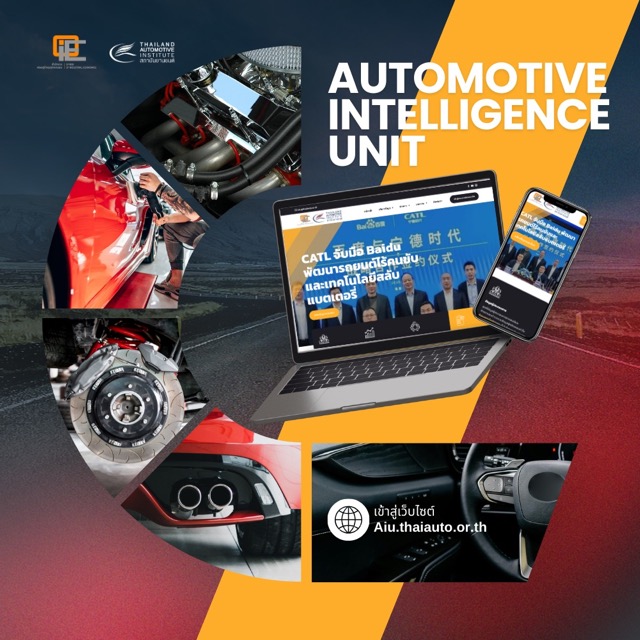- Silver
- สมาชิกระดับ Silver
- ฟรี
- สามารถเข้าถึงข้อมูลข่าวสารขั้นพื้นฐานได้
- ข้อมูลผู้ประกอบการต่างประเทศ
- ข้อมูลสถิติในประเทศและต่างประเทศ
- มาตรการทางการค้าระหว่างประเทศ
- กฎ ระเบียบ นโยบายในประเทศ
- เทคโนโลยี และงานวิจัย
- สมัครสมาชิก
ค้นหาข้อมูล
ความเคลื่อนไหวในอุตสาหกรรม
ACG มั่นใจตลาดรถยนต์เดือนพฤษภาคมโต 9% หนุนภาพรวมผลงานปีนี้สดใส พร้อมเดินหน้าขยายสาขาตามแผนที่วางไว้ คาดปีนี้เพิ่มอีก 2 แห่งในพื้นที่ภาคเหนือ และภาคตะวันออก จากการที่มีสาขา 9 แห่ง ตั้งเป้ามีสาขาครบ 15 แห่ง ภายในปี 2565 นายภานุมาศ รังคกูลนุวัฒน์ ประธานเจ้าหน้าที่บริหาร บริษัท ออโตคอร์ป โฮลติ้ง จำกัด (มหาชน) หรือ ACG ประกอบธุรกิจการถือหุ้นในบริษัทอื่น (Holding Company) ที่ประกอบธุรกิจการจำหน่ายและให้บริการในอุตสาหกรรมรถยนต์และธุรกิจอื่นที่เกี่ยวเนื่องอื่นๆ ปัจจุบันมี บริษัท ฮอนด้า มะลิวัลย์ จำกัด เป็นบริษัทแกน ซึ่งเป็นผู้จำหน่ายและศูนย์บริการรถยนต์ยี่ห้อฮอนด้า เปิดเผยว่า แนวโน้มผลการดำเนินงานของกลุ่ม ACG คาดว่าจะมีทิศทางสดใสต่อเนื่อง และยังสามารถเดินหน้าได้ตามแผนที่วางไว้ โดยมีรายงานจากสภาอุตสาหกรรมแห่งประเทศไทย (ส.อ.ท.) ซึ่งเปิดเผยเมื่อปลายเดือนมิถุนายน 2562 ที่ผ่านมาถึงยอดขายรถยนต์ภายในประเทศเดือน พฤษภาคมที่ผ่านมา มีทั้งสิ้น 88,097 คัน เพิ่มขึ้นจากช่วงเดียวกันของปีก่อน 3.7% เพิ่มขึ้นจากเดือนเมษายนที่ผ่านมา 2.4%
ยอดขายในประเทศพุ่ง
ขณะที่ยอดขายในประเทศที่เพิ่มขึ้นนั้น เนื่อจากภาพรวมเศรษฐกิจในประเทศที่ยังเติบโตดี ซึ่งนโยบายภาครัฐให้การสนับสนุนการช่วยเหลือเกษตรกร และผู้มีรายได้น้อย รวมถึงการลงทุนของภาครัฐและเอกชน นักท่องเที่ยวจากต่างประเทศยังขยายตัวดี รวมทั้งการแนะนำรถยนต์รุ่นใหม่ อย่างไรก็ตาม ในช่วง 5 เดือนที่ผ่านมารถยนต์มียอดขาย 437,722 คัน เพิ่มขึ้นจากช่วงเดียวกันของปีก่อน 9.1% รวมทั้งทาง ส.อ.ท. ยังคงเป้าหมายเรื่องยอดผลิตรถยนต์ทั้งหมดที่คาดว่าจะอยู่ที่ 2.1 ล้านคัน และยอดส่งออก 1.1 ล้านคัน ทั้งนี้ ACG ถือเป็นดีลเลอร์รถยนต์ที่มีความได้เปรียบจากการเป็นตัวแทนจำหน่ายรถยนต์ยี่ห้อฮอนด้า ซึ่งเป็นแบรนด์ที่รู้จัก และชื่นชอบผู้บริโภค ซึ่งปัจจุบัน “ฮอนด้า” ยังมีส่วนแบ่งการตลาดเป็นอันดับ 1 ในตลาดรถยนต์นั่งส่วนบุคคล ซึ่งสามารถครองส่วนแบ่งการตลาดติดต่อกัน 3 ปีซ้อน (ปี 2558-2560) ด้วยส่วนแบ่ง 31.5%,32.7% และ 32.20% ตามลำดับ
- รายละเอียด
- หมวด: ความเคลื่อนไหวในอุตสาหกรรม
- อ่าน: 1123 ครั้ง
การประชุมสุดยอดผู้นำอาเซียนครั้งที่ 34 ซึ่งประเทศไทยในฐานะประธานอาเซียนและเจ้าภาพจัดการประชุมได้เสร็จสิ้นลงไปแล้ว ท่ามกลางภาพรวมที่กลไกภาครัฐพยายามโหมประโคมถึงความสำเร็จและเรียบร้อยของการจัดการ หากแต่ในอีกด้านหนึ่งการประชุมดังกล่าวดูจะห่างไกลจากทั้งการมีส่วนรวมของประชาชนและการรับรู้ถึงประโยชน์ที่คาดว่าจะได้รับในอนาคต ไม่นับรวมถึงกระแสวิพากษ์วิจารณ์ถึงท่วงทำนองและสถานการณ์ของคณะผู้แทนไทยในการประชุมครั้งนี้ด้วย ท่ามกลางแนวคิดว่าด้วย “ร่วมมือ ร่วมใจ ก้าวไกล ยั่งยืน” ที่รัฐไทยพยายามนำเสนอควบคู่กับภารกิจสำคัญว่าด้วยการผลักดันการเจรจาความตกลงหุ้นส่วนเศรษฐกิจระดับภูมิภาค ให้สามารถบรรลุบทสรุปสำเร็จลุล่วงภายในปี 2562 ดูเหมือนว่าบริบทแห่งความเป็นไปของเพื่อนบ้านอาเซียนที่แวดล้อมดูจะก้าวไกลไปกว่าพัฒนาการของสังคมไทยอย่างน่าสนใจ ข่าวการเปิดตัว VinFast รถยนต์สัญชาติเวียดนามในช่วงเวลาไม่กี่วันก่อนหน้าการประชุมสุดยอกอาเซียน ดูจะเป็นประหนึ่งการส่งสัญญาณเตือนผู้ประกอบการในอุตสาหกรรมยานยนต์ไทยและหน่วยงานที่มีส่วนเกี่ยวข้อง ซึ่งเชื่อว่าประเทศไทยมีศักยภาพและเป็นผู้นำในอุตสาหกรรมนี้อยู่ไม่น้อย แม้ว่า Vin fast จะไม่ใช้แบรนด์รถยนต์จากประเทศเพื่อนบ้านอาเซียนแบรนด์แรกที่เกิดขึ้นก็ตาม
ที่มา : หนังสือพิมพ์ ผู้จัดการสุดสัปดาห์ ฉบับวันที่ 3 กรกฎาคม 2562
- รายละเอียด
- หมวด: ความเคลื่อนไหวในอุตสาหกรรม
- อ่าน: 1231 ครั้ง
Lucid Motors has hired Peter Hochholdinger, Tesla's former head of production, as vice president of manufacturing.The Newark, California, electric-car maker, which has a more than $1 billion investment from Saudi Arabia's Public Investment Fund, was founded in 2007 as Atieva by Sam Weng and Bernard Tse, a former vice president of Tesla.In April Lucid named Peter Rawlinson, former chief engineer of Tesla's Model S, as its CEO.Rawlinson said Hochholdinger's experience in manufacturing would help the company launch the Lucid Air and other future models.Lucid positions itself as being less of a direct competitor to Tesla than with luxury automakers such as Audi or BMW, Rawlinson has said.Hochholdinger, a former production executive at Audi, left Tesla last week after three years with the company. At Tesla, he was tasked with improving production for Tesla's luxury Model S sedan and Model X SUV as well as helping build a cost-effective manufacturing program for the Model 3 sedan.He was the latest high-profile executive to leave Tesla in the past two years as the automaker struggles to ramp up production of Model 3, which is seen as crucial for its long-term profitability.
เรื่อง : บริษัท Lucid Motors ได้มีการว่าจ้าง นาย Hochholdinger อดีตหัวหน้าฝ่ายผลิตของบริษัท เทสล่า
ทางบริษัท Lucid Motors ได้ว่าจ้างนาย Peter Hochholdinger อดีตหัวหน้าฝ่ายผลิตของบริษัท Tesla ในฐานะรองประธานฝ่ายการผลิต ผู้ผลิตรถยนต์ไฟฟ้านิวอาร์กแคลิฟอร์เนียซึ่งมีเงินลงทุนมากกว่า 1 พันล้านดอลลาร์จากกองทุนเพื่อการลงทุนสาธารณะของซาอุดิอาระเบียก่อตั้งขึ้นในปี 2550 ในฐานะ Atieva โดย Sam Weng และ Bernard Tse อดีตรองประธานบริษัทของ Tesla ในเดือนเมษายน Lucid ได้มีการว่าจ้างนาย Peter Rawlinson อดีตหัวหน้าวิศวกรของ Model S ของ Tesla ในฐานะ CEO Rawlinsonกล่าวว่าประสบการณ์ของ Hochholdingerในการผลิตจะช่วยให้ บริษัท เปิดตัว Lucid Air และรุ่นอื่น ๆ ในอนาคต Rawidinson กล่าวว่า Lucid วางตำแหน่งตัวเองว่าเป็นคู่แข่งโดยตรงกับ Tesla น้อยกว่าผู้ผลิตรถยนต์หรูหราอย่าง Audi หรือ BMW Hochholdinger อดีตผู้บริหารฝ่ายผลิตของ Audi ออกจาก Tesla เมื่อสัปดาห์ที่แล้วหลังจากสามปีกับ บริษัท ที่เทสลาเขาได้รับมอบหมายให้ปรับปรุงการผลิตสำหรับซีดานและเอสยูวีรุ่นหรูของเทสลารวมทั้งช่วยสร้างโปรแกรมการผลิตที่ประหยัดต้นทุนสำหรับซีดานรุ่น 3 เขาเป็นผู้บริหารระดับสูงคนล่าสุดที่ออกจากเทสลาในช่วงสองปีที่ผ่านมาเนื่องจากผู้ผลิตรถยนต์พยายามที่จะเพิ่มกำลังการผลิตของโมเดล 3 ซึ่งถือเป็นสิ่งสำคัญสำหรับการทำกำไรในระยะยาว
ที่มา : Automotive News Europe ฉบับวันที่ 2 กรกฎาคม 2562
- รายละเอียด
- หมวด: ความเคลื่อนไหวในอุตสาหกรรม
- อ่าน: 1113 ครั้ง
ACG มั่นใจตลาดรถยนต์เดือนพฤษภาคมโต 9% หนุนภาพรวมผลงานปีนี้สดใส พร้อมเดินหน้าขยายสาขาตามแผนที่วางไว้ คาดปีนี้เพิ่มอีก 2 แห่งในพื้นที่ภาคเหนือ และภาคตะวันออก จากการที่มีสาขา 9 แห่ง ตั้งเป้ามีสาขาครบ 15 แห่ง ภายในปี 2565 นายภานุมาศ รังคกูลนุวัฒน์ ประธานเจ้าหน้าที่บริหาร บริษัท ออโตคอร์ป โฮลติ้ง จำกัด (มหาชน) หรือ ACG ประกอบธุรกิจการถือหุ้นในบริษัทอื่น (Holding Company) ที่ประกอบธุรกิจการจำหน่ายและให้บริการในอุตสาหกรรมรถยนต์และธุรกิจอื่นที่เกี่ยวเนื่องอื่นๆ ปัจจุบันมี บริษัท ฮอนด้า มะลิวัลย์ จำกัด เป็นบริษัทแกน ซึ่งเป็นผู้จำหน่ายและศูนย์บริการรถยนต์ยี่ห้อฮอนด้า เปิดเผยว่า แนวโน้มผลการดำเนินงานของกลุ่ม ACG คาดว่าจะมีทิศทางสดใสต่อเนื่อง และยังสามารถเดินหน้าได้ตามแผนที่วางไว้ โดยมีรายงานจากสภาอุตสาหกรรมแห่งประเทศไทย (ส.อ.ท.) ซึ่งเปิดเผยเมื่อปลายเดือนมิถุนายน 2562 ที่ผ่านมาถึงยอดขายรถยนต์ภายในประเทศเดือน พฤษภาคมที่ผ่านมา มีทั้งสิ้น 88,097 คัน เพิ่มขึ้นจากช่วงเดียวกันของปีก่อน 3.7% เพิ่มขึ้นจากเดือนเมษายนที่ผ่านมา 2.4%
ยอดขายในประเทศพุ่ง
ขณะที่ยอดขายในประเทศที่เพิ่มขึ้นนั้น เนื่อจากภาพรวมเศรษฐกิจในประเทศที่ยังเติบโตดี ซึ่งนโยบายภาครัฐให้การสนับสนุนการช่วยเหลือเกษตรกร และผู้มีรายได้น้อย รวมถึงการลงทุนของภาครัฐและเอกชน นักท่องเที่ยวจากต่างประเทศยังขยายตัวดี รวมทั้งการแนะนำรถยนต์รุ่นใหม่ อย่างไรก็ตาม ในช่วง 5 เดือนที่ผ่านมารถยนต์มียอดขาย 437,722 คัน เพิ่มขึ้นจากช่วงเดียวกันของปีก่อน 9.1% รวมทั้งทาง ส.อ.ท. ยังคงเป้าหมายเรื่องยอดผลิตรถยนต์ทั้งหมดที่คาดว่าจะอยู่ที่ 2.1 ล้านคัน และยอดส่งออก 1.1 ล้านคัน ทั้งนี้ ACG ถือเป็นดีลเลอร์รถยนต์ที่มีความได้เปรียบจากการเป็นตัวแทนจำหน่ายรถยนต์ยี่ห้อฮอนด้า ซึ่งเป็นแบรนด์ที่รู้จัก และชื่นชอบผู้บริโภค ซึ่งปัจจุบัน “ฮอนด้า” ยังมีส่วนแบ่งการตลาดเป็นอันดับ 1 ในตลาดรถยนต์นั่งส่วนบุคคล ซึ่งสามารถครองส่วนแบ่งการตลาดติดต่อกัน 3 ปีซ้อน (ปี 2558-2560) ด้วยส่วนแบ่ง 31.5%,32.7% และ 32.20% ตามลำดับ
ที่มา : หนังสือพิมพ์ ทันหุ้น ฉบับวันที่ 3 กรกฎาคม 2562
- รายละเอียด
- หมวด: ความเคลื่อนไหวในอุตสาหกรรม
- อ่าน: 822 ครั้ง
การประชุมสุดยอดผู้นำอาเซียนครั้งที่ 34 ซึ่งประเทศไทยในฐานะประธานอาเซียนและเจ้าภาพจัดการประชุมได้เสร็จสิ้นลงไปแล้ว ท่ามกลางภาพรวมที่กลไกภาครัฐพยายามโหมประโคมถึงความสำเร็จและเรียบร้อยของการจัดการ หากแต่ในอีกด้านหนึ่งการประชุมดังกล่าวดูจะห่างไกลจากทั้งการมีส่วนรวมของประชาชนและการรับรู้ถึงประโยชน์ที่คาดว่าจะได้รับในอนาคต ไม่นับรวมถึงกระแสวิพากษ์วิจารณ์ถึงท่วงทำนองและสถานการณ์ของคณะผู้แทนไทยในการประชุมครั้งนี้ด้วย ท่ามกลางแนวคิดว่าด้วย “ร่วมมือ ร่วมใจ ก้าวไกล ยั่งยืน” ที่รัฐไทยพยายามนำเสนอควบคู่กับภารกิจสำคัญว่าด้วยการผลักดันการเจรจาความตกลงหุ้นส่วนเศรษฐกิจระดับภูมิภาค ให้สามารถบรรลุบทสรุปสำเร็จลุล่วงภายในปี 2562 ดูเหมือนว่าบริบทแห่งความเป็นไปของเพื่อนบ้านอาเซียนที่แวดล้อมดูจะก้าวไกลไปกว่าพัฒนาการของสังคมไทยอย่างน่าสนใจ ข่าวการเปิดตัว VinFast รถยนต์สัญชาติเวียดนามในช่วงเวลาไม่กี่วันก่อนหน้าการประชุมสุดยอกอาเซียน ดูจะเป็นประหนึ่งการส่งสัญญาณเตือนผู้ประกอบการในอุตสาหกรรมยานยนต์ไทยและหน่วยงานที่มีส่วนเกี่ยวข้อง ซึ่งเชื่อว่าประเทศไทยมีศักยภาพและเป็นผู้นำในอุตสาหกรรมนี้อยู่ไม่น้อย แม้ว่า Vin fast จะไม่ใช้แบรนด์รถยนต์จากประเทศเพื่อนบ้านอาเซียนแบรนด์แรกที่เกิดขึ้นก็ตาม
ที่มา : หนังสือพิมพ์ ผู้จัดการสุดสัปดาห์ ฉบับวันที่ 3 กรกฎาคม 2562
- รายละเอียด
- หมวด: ความเคลื่อนไหวในอุตสาหกรรม
- อ่าน: 892 ครั้ง
BMW's strategy of making its vehicle architecture more flexible is paying off — even more than it expected.Thanks to the automaker's new modular Fifth Generation Architecture, as the company calls it, BMW said it will be able to have 25 electrified models on the road by 2023 — two years earlier than it previously planned.The modular approach relies on just two versions of the architecture, allowing it to be adapted to full-electric, plug-in hybrid and combustion-engine drivetrains, the automaker said.As a result, BMW has been able to respond faster to changing conditions, the company said.More than half of the 25 models will be full electric, BMW said."We are moving up a gear in the transformation toward sustainable mobility," BMW CEO Harald Krüger said in a statement. "By 2021, we will have doubled our sales of electrified vehicles [battery-electric and plug-in hybrid] compared with 2019."BMW expects to see a steep growth curve toward 2025, Krüger said, with sales of EVs increasing by an average of 30 percent every year.Last year, BMW Group increased sales of electrified vehicles 38 percent to a combined 142,617 BMWs and Minis.The company expects to reach an overall total of half a million sales of electrified cars by the end of this year.Since the launch of the i3 in 2013, BMW has sold more than 150,000 units of the so-called "born electric" compact.
Full-electric models
This year, the automaker will start production of the electric Mini at its plant in Oxford, England. This will be followed in 2020 by the electric BMW iX3 midsize crossover, to be built in Shenyang, China, for global markets.Following in 2021 will be the iNEXT crossover, which will be made in Dingolfing, Germany, and the i4 midsize sedan, set to be assembled in Munich.BMW currently offers plug-in hybrid versions of the 3- and 7-series sedans and X3 and X5 crossovers. This summer, the company will release plug-in hybrid versions of the 5 series and 2-series Active Tourer with next-generation technology and a longer electric range. These will be followed next year by the X1 and 3-series Touring plug-in hybrids.
Zone detection
BMW also revealed last week that it has enhanced the technology of its plug-in hybrids to make them more viable in many markets.Starting next year, all BMW plug-in hybrid models will come standard with a function that automatically switches the vehicle to full-electric mode when it enters an area designated for emissions-free driving only, the company said.That issue is a growing concern to drivers in some large cities that are barring vehicle emissions in certain neighborhoods.The function, called eDrive Zones, will use geofencing detection to recognize "green zones" established by cities for emissions-free driving, and automatically change the driving mode to electric only, the automaker said.BMW hopes eDrive Zones will allow plug-in hybrids to receive the same access to green zones as full EVs because they will behave the same way in these areas, the company said.The automated operating strategy significantly boosts the attraction of plug-in hybrid vehicles to reduce emissions, BMW said.The automaker has been running a test of the technology in the Netherlands. Increasing the use of electric driving not only optimizes efficiency but also helps reduce operating costs for customers, especially in city traffic, BMW said.Automakers worldwide are facing increasing pressure to reduce tailpipe pollution. But that's especially true in Europe, where manufacturers must reduce fleet emissions to comply with new European Union rules next year. Every car in Europe is expected to require some level of electrification to meet the EU's goal of reducing average carbon dioxide emissions.
BMW อาศัยการออกแบบแพลทฟอร์มที่เน้นการติดตั้งชิ้นส่วนสำคัญแบบโมดุล ซึ่งสามารถประยุกต์เพื่อใช้สำหรับรถ BEV รถ PHEV และ รถ ICE ได้ ส่งผลให้ทาง BMW สามารถตอบสนองกับการเปลี่ยนแปลงของเทคโนโลยีได้เร็วขึ้น โดยมีแผนวางจำหน่ายรถ PHEV และ BEV รวม 25 รุ่นในปี ค.ศ. 2023 เร็วขึ้นจากเดินในปี ค.ศ. 2025 โดย อย่างน้อยครึ่งหนึ่งของรถยนต์ 25 รุ่น จะเป็นรถ BEV
จึงถึงปี ค.ศ. 2025 BMW คาดว่าตลาดรถ PHEV และ BEV จะโตขึ้นปีละ 30% และคาดว่าจะจำหน่ายรถ PHEV และ BEV สะสมครบ 500,000 ภายในสิ้นปีนี้ และทาง BMW มีแผนที่จะผลิตรถยนต์ไฟฟ้าในแบรนด์ Mini ที่ประเทศอังกฤษ ตามด้วย BMW iX3 ที่ประเทศจีนในปี ค.ศ. 2020 และ BMW iNEXT Crossover และ BMW i4 ที่ประเทศเยอรมนี ในปี ค.ศ. 2021
และเพื่อเป็นการตอบสนองต่อการประกาศพื้นที่มลพิษต่ำ ที่อนุญาตให้เฉพาะรถยนต์ที่ไม่ปล่อยมลพิษเข้าพื้นที่เท่านั้น BMW ได้พัฒนาระบบการปรับเปลี่ยนรูปแบบการขับขี่เป็นการขับขี่ด้วยระบบไฟฟ้า เพื่อให้รถ PHEV มีการขับขี่เหมือนกับรถ BEV ในพื้นที่ดังกล่าว และหวังว่ารถ PHEV ที่ติดตั้งระบบอัตโนมัติ จะได้รับการยอมรับให้ใช้งานในพื้นที่มลพิษต่ำได้
- รายละเอียด
- หมวด: ความเคลื่อนไหวในอุตสาหกรรม
- อ่าน: 1193 ครั้ง
บีเอ็มดับเบิ้ลยู ตอบรับกระแสโลก ยานยนต์ขับเคลื่อนพลังงานไฟฟ้า จัดเสวนา “The Future of Mobility” เผยปี 2564 บีเอ็มดับเบิ้ลยู กรุ๊ป จะมีรถยนต์ไฟฟ้าทั้งหมด 5 รุ่น คือ บีเอ็มดับเบิ้ลยู i3, มินิ อิเล็กทริค,บีเอ็มดับเบิ้ลยู iX3, บีเอ็มดับเบิลยู iNEXT และภายในปี 2568 จะมีรถยนต์ที่ขับเคลื่อนด้วยพลังงานไฟฟ้ารวมทั้งหมด 25 รุ่น ประกอบด้วยรถยนต์ไฟฟ้าแบบแบตเตอรี่ 12 รุ่น ล่าสุดลงทุนกว่า 400 ล้านบาท ประกอบแบตเตอรี่แรงดันสูงในไทย และอีก 700 ล้านบาท ประกอบรถยนต์ปลั๊กอินไฮบริด นายคริสเตียน วิดมานน์ ประธาน บีเอ็มดัเบิ้ลยู กรุ๊ป ประเทศไทย เปิดเผยว่า การจัดงานเสวนารวมผู้เชี่ยวชาญในอุตสาหกรรมยานยนต์ มาร่วมกันแสวงหาแนวทางสู่อนาคตที่ลดมลภาวะจากการใช้พลังงานสะอาดครั้งนี้เพื่อรองรับการเติบโตของยานยนต์ไฟฟ้าในประเทศไทยและตอบรัลบแผนพลังงาน ที่ได้ตั้งเป้ายอดการใช้งานรถยนต์ไฟฟ้าและรถยนต์ปลั๊กอินไฮบริดในประเทศไทยไว้ 1.2 ล้านคันภายในปี 2579 โดยในปี 2561 ที่ผ่านมา บีเอ็มดับเบิ้ลยูมียอดรถยนต์ปลั๊กอินไฮบริด (PHEV) ในประเทศไทยที่พุ่งสูงขึ้นถึง 122% จากการเปิดตัวรุ่น 530e,740Le, i8 Coupe และ 18 Roadster พร้อมการขยายเครือข่ายการให้บริการสถานีอัดประจุไฟฟ้าสาธารณะสำหรับรถยนต์ไฟฟ้าและรถยนต์ปลั๊กอิน ไฮบริดอย่างต่อเนื่อง สานต่อจากการริเริ่มโครงการ ChargeNow เมื่อปี 2560 โดยสร้างเครือข่ายสถานีอัดประจุไฟฟ้าที่สมาชิก ChargreNow ไม่ว่าจะเป็นรุ่นใดหรือยี่ห้อใดก็สามารถมาใช้บริการได้ที่สถานี ChargeNow ทุกสาขา โดยปัจจุบันให้บริการทั้งหมด 121 หัวจ่าย ทั้งที่สถานี ChargeNow และที่ผู้จำหน่ายอย่างเป็นทางการของบีเอ็มดับเบิ้ลยู ใน 57 แห่ง ทั่วประเทศไทย
ที่มา : หนังสือพิมพ์ สยามธุรกิจ ฉบับวันที่ 2 กรกฎาคม 2562
- รายละเอียด
- หมวด: ความเคลื่อนไหวในอุตสาหกรรม
- อ่าน: 1070 ครั้ง
งานบางกอก อินเตอร์เนชั่นแนล ออโต ซาลอน 2019 ปีนี้จัดภายใต้แนวคิด World Class Auto Fest เทศกาลรถแต่งระดับโลกเริ่ม 3-7 กรกฎาคม 2562 ณ ชาเลนเจอร์ ฮอลล์ 3 อิมแพ็ค เมืองทองธานี ตื่นตาตื่นใจกีบสุดยอดรถแต่งส่งตรงจากญี่ปุ่น ที่มาพร้อม เซ็กซี่ เกิร์ล สร้างสีสันสุดเร้าใจในงานปีนี้ โดยทัพสุดยอดรถแต่งจากญี่ปุ่นที่มาอวดโฉมเผยนวัตกรรมเทรนด์การแต่งรถ ที่เป็นไฮไลต์เด็ดของปีนี้ได้แก่ รถยนต์ Suzuki Jimny Wald Bison Edition เป็นต้น ที่จัดมาเพื่อสาวกรถแต่ง ผู้ที่ชื่นชอบการแต่งรถอย่างเต็มรูปแบบ ที่สำคัญคือการมาโชว์โฉมของบรรดาสาวสวยประเทศญี่ปุ่น เอมิริ ฮาสึกิ และ ซูซูโนะ โกโตะ “ออโต ซาลอน เรซควีน เจแปน” ประชันสาวสวยเมืองไทย เชอรี่ และ เฌอเบล “ออโต ซาลอน เรซควีน ไทยแลนด์” กระชากทุดดีกรีความเซ็กซี่ นอกจากนี้ ภายในงาน บางกอก อินเตอร์เนชั่นเนล ออโต ซาลอน 2019 ยังเปิดขายรถใหม่ อุปกรณ์ตกแต่งไทยและต่างประเทศ พร้อมโปรโมชั่นจากบริษัทรถยนต์ รถจักรยานยนต์ และสำหรับผู้ซื้อรถภายในงานลุ้นรถมาสด้า 2 ออโต ซาลอน เอดิซั่น,ลุ้นเที่ยวญี่ปุ่น,ซื้อสินค้าภายในงานครบ 1,000 บาท รับทันทีบัตรกำนัล รวมมูลค่ากว่า 2 ล้านบาท ผู้สนใจเข้าชมงานบัตรจำหน่ายในราคา 100 บาท
ที่มา : หนังสือพิมพ์ สยามธุรกิจ ฉบับวันที่ 2 กรกฎาคม 2562
- รายละเอียด
- หมวด: ความเคลื่อนไหวในอุตสาหกรรม
- อ่าน: 1128 ครั้ง
Five Japanese automakers including Subaru, Suzuki and Mazda are each investing 2 percent in the on-demand, self-driving vehicle service set up by SoftBank and Toyota.Mazda, Suzuki, and Subaru, Isuzu Motors and Toyota's compact car unit Daihatsu will each invest 57.1 million yen ($530,620) in the venture -- called Monet -- in return for a 2 percent stake, the companies said in a statement Friday.SoftBank and Toyota will each retain their 35 percent stakes in the company, which is now capitalized at $26.6 million. The latest investors join Honda and Hino Motors, Toyota's truck-making operations.Honda and Hino said Friday they were making additional investments in the service but will each retain 10 percent stakes.The venture, launched in October, plans to roll out on-demand bus and vehicle services in Japan in the next year, and a services platform for electric vehicles in the country as early as 2023 based on Toyota's boxy "e-palette" multi-purpose vehicle.Monet is building up members as it joins the ride-sharing landscape which is dominated by startups such as Uber Technologies, Didi Chuxing and Lyft, as traditional automakers band together to compete in an industry which is placing growing emphasis on offering vehicle services rather than selling cars to individual drivers.Automakers are increasingly joining forces with technology companies as well as each other as they grapple with the large investment and software expertise required to develop these new services for which demand has yet to be tested.The new investment will see Suzuki, Mazda and Subaru deepen their partnership with Toyota, as they have already agreed to tap the r&d firepower of Japan's biggest automaker for EVs and other future vehicle technologies.Friday's announcement comes after Monet's CEO told Reuters earlier this month it was planning to expand its investor base and start operating in Southeast Asia next year.
เรื่อง มาสด้า ซูบารุ ร่วมทุนกับโตโยต้าในการทำรถยนต์ขับขี่อัตโนมัติ
ค่ายรถยนต์ญี่ปุ่นมีการจับมือกันในการพัฒนาบริการรถยนต์ขับขี่อัตโนมัติ โดยใช้ชื่อว่า MONET โดยมีผู้ถือหุ้นรายใหญ่คือโตโยต้าและ Softbank(บริษัทผู้นำด้านเทคโนโลยีของญี่ปุ่น) ฮอนด้าและฮีโน่ลงทุนร้อยละ 10 และเมื่อเร็วๆ นี้ผู้ผลิตรถยนต์อีก 5 ค่ายได้ลงทุนร้อยละ 2 ต่อค่าย ประกอบไปด้วย มาสด้า ซูบารุ ซูซูกิ อีซูซุ และไดฮัทซุ โดยจะมีรถบัสการให้บริการในปีหน้า และในปี 2030 จะมีรูปแบบบริการ(services platform) สำหรับรถยนต์ไฟฟ้าในปี 2030 ในรถรุ่น e-palette ของโตโยต้า
ที่มา : https://europe.autonews.com/automakers/mazda-subaru-join-toyotas-self-driving-vehicle-venture
- รายละเอียด
- หมวด: ความเคลื่อนไหวในอุตสาหกรรม
- อ่าน: 1116 ครั้ง


